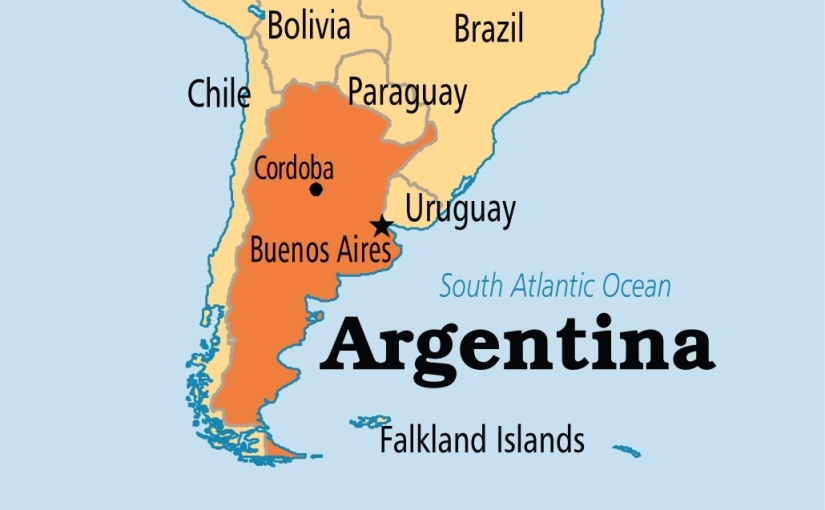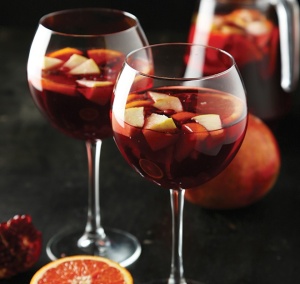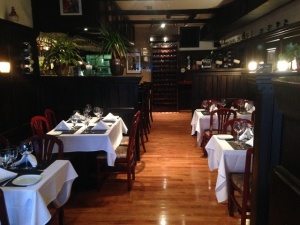This week my daughter and I visited one of our favorite local restaurants. It’s only been in town for a couple of years, having replaced what was a longtime favorite English-style pub. This Argentinian restaurant is not a place I’d normally frequent because I used to associate this cuisine with a lot of meat-based dishes. But a good friend recommended their $10 lunch special that is, indeed, satisfying and delicious and offers a variety of choices. During the winter my daughter and I had lunch there about once every two weeks and became acquainted with the staff.
We decided to go there this week to have their super-delicious poached salmon served on a bed of sauteed vegetables smothered in butter and herbs. We often share a large glass of Sangria (two straws) since my daughter has to return to work and I certainly don’t need to be tipsy in mid-day!
Our usual host was not there today, but our waiter was. Upon being seated at our favorite table, I asked him a question about the phrase, Que pasa?…which, loosely translated means “what’s happening,” or “what’s going on” in Spanish. My daughter had recently heard this phrase pronounced as “Que paso?”with the accent on the final syllable. We asked about the difference in pronunciation and meaning. After he gave us a quick but capable explanation, we got into a longer discussion of languages in general. Our waiter is from El Salvador and has lived and worked in many places in the US since he arrived at age 10, most of them in the South. He described himself as having a gift for languages and I believe him because he is quite fluent in grammatically correct English which is not usually the case with immigrants who are not taught English in school.
I gave him a short lesson on the difference between the verb to pronounce and the noun “pronunciation.” During our discussion he had mistakenly used the word “pronunciate” until I explained to him why this was not correct usage. He thanked me for correcting him and helping him to learn the correct usage, saying no one ever does this for him.
Then he helped us to say a couple of things we were struggling with in Spanish, correcting our usage as well. This was a delightful and friendly exchange of linguistic and cultural information between people from entirely different backgrounds. It was not a virtual lesson in cultural exchange, but a real-time event between live people, and was therefore very enjoyable and satisfying.
Now we can’t wait to go back for more salmon (or steak) and to exchange more language tips while sipping our sangria. Who knows? Maybe one day we’ll visit this gorgeous country and actually sample the real deal!





This is a lovely Slice! The food sounds delicious and the people sound delightful! I love how you take the time to get to know the staff and talk to them and learn from them. It’s really great to read about.
LikeLike
Thank you for your lovely comment. I am a language and culture enthusiast so I seek out these kinds of interactions whenever possible. We were lucky to be able to get to know these people during the slower times in the winter.
LikeLike
It sounds like a fabulous find: good food, good company, and language lessons!
LikeLike
We feel lucky to have them in our neighborhood. My daughter and I have had a number of relaxing and friendly experiences there.
LikeLike
What a great place for teachable moments and fine dining.
LikeLike
We have really been enjoying having them in our town for so many reasons!
LikeLike
How great that you can give each other a mini language lesson while waiting for a delicious meal.
LikeLike
Language is so important in our new, more diverse world, isn’t it? It helps to show an interest in someone else’s I have found.
LikeLike
It’s so nice when you find a restaurant that you really like — and even better when you get to know the staff. What a great opportunity for all of you to learn about languages, too!
LikeLike
Food, drink and friendship…it’s an unbeatable combination!
LikeLike
It’s wonderful that you go for the food, and share enough of yourselves to really get to know the staff, have a “real” conversation. I bet that waiter enjoyed the time too. It would be nice if others were open to doing this.
LikeLike
I enjoy interacting with people, and I try to learn from people from other cultures. Language is my “thing,” so it’s easy for me to get involved in these kinds of conversations. Just another wacky old lady, I guess!
LikeLike
Barbara, this is great. You don’t get a lot of time to interact in those situations, but I always say that kindness and friendliness are the ultimate ambassadors… and you’ve shown that!!! Maybe you can share wallet pics next time and expand the conversation!
LikeLike
Thanks for the suggestion. I’ll do that. And you are right about kindness and friendliness: they win every time!
LikeLiked by 1 person
One of the things about rural Iowa is the lack of cultural experiences we are given. Hamburgers, fries, and pizza are pretty standard fare around here. I appreciate both the language lesson and your description of the food too! While I love where I live, I am envious of this slice! 🙂
LikeLike
If you ever come to Long Island, I’ll take you there for lunch. I’d love to visit Iowa someday, too, but not for the food! We put up with a lot to live here in the Northeast, but there are definite benefits!
LikeLike
Another reason I love reading you Barbara! This is such a simple little thing to do but ti turned out to be a delicious experience. When I lived in Paris and would go to different ,places, the caissier at the various museums would revert to English the second they heard my accent (though I swore I had beaten out the suburbs of Philly in me!). I was practicing my French. They were practicing their English. It was all very lovely. N’est-ce pas!
LikeLike
Eating out is so much more than just great food. I am totally loyal to the feel of the place and the staff. What a great evening- jealous!!!!
LikeLike
You are so right about a restaurant being more than just food. It has to feel right and you do have to feel comfortable with the staff. Thanks for the additional insight.
LikeLike
What a great experience! Languages are interesting, I often wish I had more aptitude for picking up languages. It was amazing to listen to some of the guides and learn that they speak at least five different languages.
LikeLike
Well, we each have our own gifts and mine happens to be languages. From what I have observed, you have lots of gifts of your own, not least of which is joie de vivre…the true gift! And, yes, sigh. Everyone does speak at least 2 languages in Europe making us look like a bunch of language-challenged dolts!
LikeLike